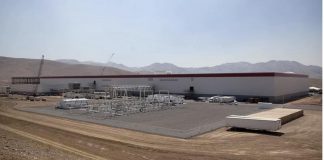Thanks, Uncle…
FRANKFURT — Volkswagen Group slumped to a third-quarter operating loss over costs related to its rigging of diesel emissions tests, its first quarterly deficit in more than 15 years.
The company posted a 3.48 billion-euro ($3.84 billion) third-quarter operating loss, compared with a 3.23 billion-euro profit a year ago.
The cheating scandal accounted 6.7 billion euros in special costs in the third quarter, more than the 6.5 billion euros it originally set aside, VW said today.
The company said sales revenue rose 5.3 percent to 51.49 billion euros.
“The figures show the core strength of the Volkswagen Group on the one hand, while on the other the initial impact of the current situation is becoming clear,” CEO Matthias Mueller said in a statement.
VW is bracing for costs that analysts have estimated could total from 20 billion euros to as much as 78 billion euros.
Fallout ‘contained’
Analysts today said VW has so far contained the financial fallout from its emissions cheating as its namesake VW car brand boosted third-quarter margins and provisions to cover fines and recalls rose only moderately.
The VW brand, which faces the biggest impact from years of cheating on diesel emissions, widened its return to 3 percent of sales from 2.8 percent a year ago as operating profit jumped 17 percent.
VW Group’s 29 percent surge in net liquidity, to 27.8 billion euros, as well as the limited rise in provisions for the diesel scandal are positive signs for its ability to weather the crisis, said Sascha Gommel, a Frankfurt-based analyst with Commerzbank. “I expect VW to have a high degree of visibility on what is needed to fix the cars by now, so there would be a high degree of confidence” behind its provisions figure, he said.
Arndt Ellinghorst, Evercore ISI head of global automotive research, said the fact that VW has kept the provision for the scandal unchanged is a positive signal. “Management has had more insight into the potential recall related costs and the fact that the provision hasn’t spiraled materially higher is a good thing,” he said in a note to investors.
VW shares rose the most in three weeks as Mueller said the company has the strength to overcome the scandal. Shares rose as much as 4.2 percent and traded up 3.2 percent to 108.5 euros at 9:38 a.m. in Frankfurt. Volkswagen has lost some 21 billion euros in market capitalization since the scandal became public on Sept. 18.
Lower full-year forecast
The company said full-year operating group profit will come in “significantly below” year-ago levels because of costs related to the emissions scandal. Excluding costs of the diesel scandal, VW still expects its group operating margin to come in between 5.5 percent and 6.5 percent this year, after 6.3 percent in 2014.
VW stuck to its guidance for full-year deliveries to be on a par with last year’s record 10.14 million auto sales.
The company confirmed the third-quarter loss was its first quarterly loss in at least 15 years but, due to accounting changes, was unable to say precisely when the last loss occurred.
VW Group plans to cut investments by 1 billion euros a year at its core division, which accounts for 5 million cars to be recalled. Luxury division Audi, source of about 40 percent of VW group profit, will also cut planned spending.
VW may need to set aside more money for measures to stabilize sales if deliveries take a hit from the scandal, Mueller has said. Steps could include discounts on new cars if owners turn in old models as well as cheap loans and incentives to dealers to buy back older cars.
Group deliveries, which also include premium brands Audi and Porsche, slid 1.5 percent in September to 885,300 cars and fell 3.4 percent in the third quarter to 2.39 million cars, causing VW to drop behind Japanese rival Toyota in nine-month global auto sales charts after clinching the top spot three months earlier.









And the damage to VW continues. Here’s dubious conjectures promoted by The Atlantic and Vox.
From http://www.theatlantic.com/technology/archive/2015/10/volkswagen-lied-60-people-died/413089/
Volkswagen Lied, 60 People Died, Scientists Say
The first peer-reviewed study of the company’s defeat devices says that 200 Americans could be killed eventually if the cars aren’t fixed.
About 60 Americans have already died prematurely as a result of the “defeat devices” that Volkswagen installed in 500,000 cars to avoid federal pollution requirements. If the cars are not recalled, turned in, and adequately fixed, about 140 people will eventually die in the United States as a result of the car manufacturer’s malfeasance.
Those numbers are according to the first peer-reviewed study of the phenomenon, which was published Thursday in Environmental Research Letters, an open-access journal. Its estimates are notable not only for their methodology, but also for their size. All previous estimates of the defeat device’s consequences were conducted back-of-the-envelope by news organizations, and they were all comparatively smaller: The New York Times estimated 40 additional deaths in the U.S., Vox calculated between five and 27 deaths, and the Associated Press approximated to between five and 20.
Steven Barrett, a professor of aerospace and energy at the Massachusetts Institute of Technology, said the equivalent costs of Volkswagen’s pollution came to about $450 million over the period the cars were sold. Eventually, the cars could cost Americans an additional $910 million. But there is some good news.
“If people do turn in those cars, most of those 140 deaths would be averted,” Barrett told me.
The study also was the first to estimate additional medical costs attached to the company’s diesel cars. Additional nitrous-oxide and particular matter released by the cars led to Americans (especially those with a chronic respiratory condition, like asthma) suffering about 30 cases of chronic bronchitis, 120,000 restricted activity days, and 210,000 days of lower respiratory-system functioning. It also caused people to use bronchodilator drugs—like albuterol—33,000 more days than they would otherwise.
Barrett said that researchers would likely next turn their attention to Europe, where diesel cars, especially those manufactured by Volkswagen, constitute a much larger percentage of cars on the road. Many of those countries, as well, have more stringent nitrous-oxide rules.
“The U.K. alone has 1.2 million of these affected vehicles for example. That’s twice as many cars, and in a more densely populated country, so that suggests there are other countries beyond the U.S. worth looking into,” he said.
The Atlantic has reached out to Volkswagen for comment, and will update this story with any response.
It’s amazing how complaint the intellectual class is to government’s needs. DU, broken nuclear plants, giant oil spills, and much much more… oh we can’t prove those things harmed anyone. Clean up workers for various spills, accidents, terrorist acts, etc dying left and right? Oh there’s no way to link their aliments to the work they did. In fact it was all perfectly and completely safe and still is. I would not be surprised if they said we can eat fish caught just in front of the broken reactors in Japan. Oh but a violator of a state edict that isn’t in the government’s good graces and didn’t get permission to violate it first? Oh they can prove that there are X number people dead because of it.
What a crock of …..
I don’t know any VW drivers of newer ones (both gas and diesel) that aren’t happy with their cars. Not one. One I know that has a diesel is going to dodge the “fix” as long as he can, because he knows it will lower his satisfaction of his car.
The loss is entirely because of the fallout of the “scandal”. Not because customers are unhappy with VW’s products.